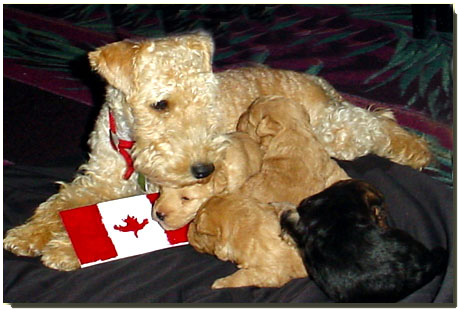
Lakeland Terrier
Group: Terrier Group
Origin: Great Britain
Height: Ideal height for a male is 14 1/2 inches (37 cm) at the withers. Females are generally about one inch smaller.
Weight: Males weigh approximately 17 lbs (7.5 kg). Males are squarely built and females may be slightly longer in length.

Teddy, 7 Weeks Old
Photo courtesy of Debbie Morrell,
Breeder with puppies available occasionally.
CLICK HERE to View Breeder Listings
Breed Profile
The Lakeland Terrier, once known as the Patterdale Terrier, originated in Cumberland County in England in the early 19th century. The Lakeland was bred to hunt vermin in the rugged shale mountains of the northern England Lake District. Some of the breeds involved in the development of the Lakeland Terrier include: The Wire Fox Terrier, the Border Terrier, the Bedlington Terrier, and the early Dandie Dinmont Terrier.
The Lakeland has the typical Terrier temperament, that being bold, friendly, happy and self-confident. He makes a good watchdog and a great companion. He is typically alert, loves activity and is always ready to go. At times, he is also very intense and determined. Shyness and over aggressiveness is not typical of the breed.
He has a short, hard and wiry outer coat with a soft undercoat. He comes in a variety of colours, including blue, black, liver, black and tan, blue and tan, red, red grizzle, grizzle and tan, or wheaten.
Health Issues
If you are considering the adoption of a Lakeland Terrier puppy, or any breed, it is very important to be selective in choosing a responsible and reputable breeder. Ensure that the prospective puppy’s parents have all health clearances. Breeding of any dog should not be done until after they have been proven to be free of evidence of significant hereditary diseases. (For more information on selecting a breeder, see the articles on the General Information page.)
Additional Health Resources:
- Health and Nutrition — Growing section of the Canada’s Guide to Dogs website which includes information on several health and nutrition related issues.
- Canine Health Information Center (CHIC) — Providing a source of health information for owners, breeders, and scientists that will assist in breeding healthy dogs. CHIC is a centralized canine health database jointly sponsored by the AKC/Canine Health Foundation (AKC/CHF) and the Orthopedic Foundation for Animals (OFA).
- AKC Canine Health Foundation — Working towards developing scientific advances in canine health.
- Companion Animal Eye Registry (CAER)
- Orthopedic Foundation for Animals (OFA)
- Ontario Veterinary College (OVC)
- University of Pennsylvania Hip Improvement Program (PennHip)
- HealthGene — HealthGene Corporation is the leading provider of veterinary DNA diagnostic services in Canada.
- Labgenvet — Laboratory of Veterinary Genetics is a Canadian diagnostic laboratory that offers a comprehensive service of DNA tests for veterinary genetic diseases.
Grooming Information
- Grooming for the Show Ring
- Grooming — This section of the Canada’s Guide to Dogs website includes tips, articles and information covering all aspects of dog grooming along with a listing of Groomers from across Canada.
Training Resources
- Training — For training information, see this growing section of the Canada’s Guide to Dogs website for tips, articles, as well as listings of training centres across Canada.
Additional Information
- Clubs, Sports & Activities — For information on the many sports and activities you can get involved in with your dog.
- Working Dogs — The Working Dogs section of the Canada’s Guide to Dogs website provides information and listings of organizations that are involved in various dog jobs, such as Guide Dogs, Therapy Dogs, Police Dogs, Protection Dogs, and much more.
Breed Listing
*NOTE 1: CHIC – The Canine Health Information Center “is a database of consolidated health screening results from multiple sources. Co-sponsored by the Orthopedic Foundation for Animals (OFA) and the American Kennel Club (AKC) Canine Health Foundation, CHIC works with parent clubs to identify health screening protocols appropriate for individual breeds. Dogs tested in accordance with the parent club established requirements, that have their results registered and made available in the public domain are issued CHIC numbers.” To learn more, visit: www.caninehealthinfo.org
*NOTE 2: The Fédération Cynologique International (FCI) is the World Canine Organization, which includes 91 members and contract partners (one member per country) that each issue their own pedigrees and train their own judges. The FCI recognizes 344 breeds, with each being the “property” of a specific country. The “owner” countries write the standards of these breeds in co-operation with the Standards and Scientific Commissions of the FCI, and the translation and updating are carried out by the FCI. The FCI is not a breed registry nor does it issue pedigrees.
Quick Links
Get In Touch
- Email: canadasguidetodogs@gmail.com
- Email: info@canadasguidetodogs.com
- Visit us on Facebook: www.facebook.com/CanadasGuideToDogs
— CanadasGuideToDogs.com is an Amazon Associate as well as a participant in various affiliate programs, as such fees are earned from qualifying purchases.

